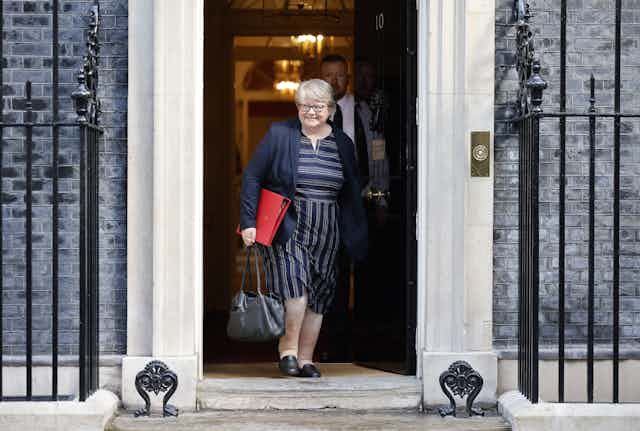Liz Truss’s cabinet is taking shape, so far with few surprises as the new prime minister names allies to key posts. Much discussion has centred on the diversity of the top team, with Kwasi Kwarteng as chancellor and Suella Braverman as home secretary.
Truss’s first announced appointment is also noteworthy. She named Thérèse Coffey, one of her closest friends in politics, as deputy prime minister (DPM). In doing so, Truss has broken a longstanding political glass ceiling. Coffey is the first female DPM.
There is no set job description for the DPM. It’s merely a title given by the prime minister to a senior colleague. As it’s not an official appointment, holding some other, more constitutionally secure position is a requirement of being DPM simply to be awarded a salary. In Coffey’s case, her necessary side hustle is as secretary of state for health and social care. Her predecessor as DPM, the Rishi Sunak-supporting Dominic Raab, was also lord chancellor and secretary of state for justice.
There are, however, some expectations that come with the title. A DPM becomes the default stand-in for events such as prime minister’s questions should the prime minister be unavailable. The prospect of Coffey facing Angela Rayner, Labour’s deputy leader, across the despatch box awaits.
Less conspicuously yet more significantly, DPMs often take on a coordination role at the heart of government. Figures such as Willie Whitelaw (Margaret Thatcher’s DPM), Michael Heseltine (under John Major) and John Prescott (for Tony Blair) were involved in chairing various cabinet committees and conducting other mundane but vital tasks. This left their bosses free to attend to more headline-grabbing activities.
DPMs also sometimes take the lead on time-consuming but important policy areas that straddle departmental boundaries. Damian Green, who played a deputy role for Theresa May, had an important role negotiating with the devolved governments.
Similarly, some become important government communicators, fulfilling the role of “minister for the Today programme”. Heseltine was perhaps the best example of this. So it is notable that, on the first morning of the Truss government, Coffey was the minister taking on the main media duties.
Another role sometimes played is as arbiter between fractious members of the cabinet and settling the nerves of disgruntled backbenchers. For this particular government, the backbenches are likely to be the main focus of difficulty, newly packed as they are by disappointed Sunak supporters. Whether Coffey possesses the skills of, say, Whitelaw to deal with this situation, we shall see.

Many prime ministers have entered office confident that they don’t need the special support a named deputy can provide. However, they often reconsider once the situation has become sticky and their leadership is placed in jeopardy. Major made Heseltine DPM in 1995 after both Black Wednesday and “the bastards” in cabinet destabilised his premiership. And Gordon Brown chose longtime rival Peter Mandelson as his DPM “in all but name” in 2009 as his leadership was buckling under the financial crisis and other stresses.
Truss inherits myriad crises and so, wisely, has not wasted any time in naming her deputy. Coffey may play a specific role in tackling one of these problems, such as the energy crisis. But more likely, her role will be behind the scenes, ensuring the ordinary business of government ticks over, allowing Truss to concentrate on tackling emergencies.
Potential roadblocks ahead
There are potential problems with the new arrangement, however. Coffey has only been a cabinet minister for three years, and is some way short of possessing, to use political scientist Anthony King’s phrase, “big beast” status. This is the je ne sais quoi of figures such as Whitelaw, Heseltine and Prescott, who were respected and listened to by colleagues. This status gave these particular ministers authority beyond their title.
However, simply bearing the title of DPM does, eventually, bring its own status. It may not be worth a hill of beans constitutionally speaking but, as a symbol, it can be significant. As Nick Clegg, another former DPM, noted in his memoir: “The symbolism and imagery of power shape people’s perceptions of who is wielding it. And perception is nine-tenths of the reality of power.” In any case, in Truss’s cabinet, Coffey’s three years makes her, comparatively speaking, a well-established fixture.

A more significant issue is that simply being health secretary is a substantial departmental load at the best of times. With the NHS struggling mightily nearly three years into the pandemic, the minister responsible has one of the most challenging portfolios in government. Tellingly, in her first speech as prime minister, Truss identified fixing the NHS as one of her top priorities. To combine this responsibility with the task of being DPM is asking a lot of any individual.
Some successful DPMs, such as Whitelaw and Prescott, began their terms with major departmental responsibilities, but these were dropped after a few years as they became, effectively, full-time deputies. This allowed them to be better able to fulfil that vital coordination role at the centre of government.
Appointing the DPM to a cushy post such as first secretary of state or lord president of the council is the traditional way for a DPM to still get paid while giving the deputy role the attention it deserves. To give Coffey the best chance of making her deputyship a success, Truss should have gone down this route. And, for the sake of the survival of her premiership, Truss really does need her deputy to succeed.

